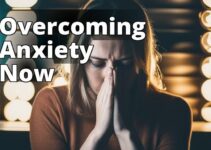Anxiety disorders are a prevalent and often misunderstood mental health condition that can significantly impact an individual's daily life. Understanding the signs, causes, and remedies for anxiety disorders is crucial for promoting awareness and providing support to those affected. This article aims to unravel the intricacies of anxiety disorders, address common misconceptions, and provide valuable insights into seeking help and coping strategies.
Understanding Anxiety Disorder Definition
By reading this article, you will learn:
– An in-depth definition and overview of anxiety disorders, including different types such as generalized anxiety disorder, panic disorder, social anxiety disorder, and specific phobias.
– The symptoms, causes, and risk factors associated with anxiety disorders, as well as the diagnosis and assessment criteria.
– Treatment options, coping strategies, impact on daily life, the importance of seeking help, and resources available for individuals with anxiety disorders.
What Is an Anxiety Disorder?
An anxiety disorder is a mental health condition characterized by persistent feelings of fear, worry, or anxiety that can interfere with daily activities. It is not merely experiencing occasional stress or nervousness; rather, it is a complex condition that often requires professional intervention.
Types of Anxiety Disorders
- Generalized Anxiety Disorder (GAD)
GAD involves excessive, uncontrollable worry about everyday things, often leading individuals to anticipate disaster and be overly concerned about various aspects of life. - Panic Disorder
This disorder entails recurrent unexpected panic attacks, marked by sudden periods of intense fear that may include palpitations, sweating, shaking, shortness of breath, numbness, or a feeling of impending doom. - Social Anxiety Disorder
Also known as social phobia, this disorder involves an overwhelming fear of social situations and being scrutinized or judged by others. - Specific Phobias
Specific phobias are characterized by an intense, irrational fear of a specific object or situation, such as heights, flying, or animals.
Symptoms of Anxiety Disorders
Physical Symptoms
- Rapid Heartbeat
Anxiety disorders may cause a rapid heart rate, a common physiological response to stress and anxiety. - Sweating
Excessive sweating, particularly in stressful situations, is a common physical symptom of anxiety disorders. - Trembling
Trembling or shaking is a physical manifestation of the body's response to heightened anxiety and fear. - Dizziness
Feelings of lightheadedness or dizziness can accompany anxiety and panic attacks.
Emotional Symptoms
- Excessive Worry
Persistent and excessive worry about various aspects of life is a hallmark emotional symptom of anxiety disorders. - Fear
Intense and irrational fear, disproportionate to the actual threat, characterizes anxiety disorders. - Irritability
Anxiety disorders can lead to irritability, making it challenging to manage daily interactions and stressors. - Difficulty Concentrating
Individuals with anxiety disorders may struggle to concentrate due to persistent worry and fear.
Behavioral Symptoms
- Avoidance Behaviors
Those with anxiety disorders may engage in avoidance behaviors to steer clear of situations that trigger their anxiety. - Compulsive Behaviors
Some individuals may exhibit repetitive, compulsive behaviors as a means of managing their anxiety. - Restlessness
Restlessness, agitation, and an inability to relax are common behavioral symptoms of anxiety disorders.
Anxiety disorders can significantly impact an individual's life, leading to emotional distress and affecting their ability to function effectively in various environments.
Causes and Risk Factors
Understanding the underlying causes and risk factors associated with anxiety disorders is essential for developing effective interventions and support strategies.
Genetic Predisposition
Research suggests that genetic factors can contribute to an individual's susceptibility to anxiety disorders. A family history of anxiety or other mental health conditions may increase the likelihood of developing an anxiety disorder.
Environmental Factors
Environmental stressors, such as trauma, abuse, neglect, or significant life changes, can play a role in triggering or exacerbating anxiety disorders. High-stress environments and adverse childhood experiences can have lasting effects on mental health.
Trauma or Stressful Life Events
Experiencing traumatic events or prolonged exposure to stressful situations can significantly impact an individual's mental well-being, potentially leading to the development of anxiety disorders.
Neurobiological Factors Contributing to Anxiety Disorders
Neurobiological research suggests that imbalances in brain chemistry and neurotransmitters, such as serotonin and dopamine, may contribute to the onset of anxiety disorders.
| Causes and Risk Factors | Description |
|---|---|
| Genetic Predisposition | Genetic factors that may contribute to an individual's susceptibility to anxiety disorders, such as a family history of anxiety or other mental health conditions. |
| Environmental Factors | Stressors, trauma, abuse, neglect, or significant life changes that can trigger or exacerbate anxiety disorders. |
| Trauma or Stressful Life Events | Experiencing traumatic events or prolonged exposure to stressful situations that can significantly impact an individual's mental well-being. |
| Neurobiological Factors | Imbalances in brain chemistry and neurotransmitters, such as serotonin and dopamine, that may contribute to the onset of anxiety disorders. |
Diagnosis and Assessment
Healthcare professionals use the Diagnostic and Statistical Manual of Mental Disorders (DSM-5) to diagnose and classify anxiety disorders, ensuring standardized assessment and diagnosis. They may also use various screening tools and assessments to evaluate the presence and severity of anxiety disorders, enabling personalized treatment planning and intervention. Seeking professional evaluation is crucial for individuals experiencing symptoms of anxiety disorders, as early diagnosis and intervention can significantly improve outcomes and quality of life.
Treatment Options
Effective treatment strategies for anxiety disorders often involve a combination of therapy, medication, and lifestyle modifications.
Therapy
- Cognitive-Behavioral Therapy (CBT)
CBT helps individuals identify and modify negative thought patterns and behaviors associated with anxiety. - Exposure Therapy
This therapeutic approach involves gradually exposing individuals to anxiety triggers, allowing them to learn healthier ways of coping.
Medication
- Selective Serotonin Reuptake Inhibitors (SSRIs)
SSRIs are commonly prescribed antidepressants that can help alleviate symptoms of anxiety disorders by regulating serotonin levels in the brain. - Benzodiazepines
These medications may provide short-term relief from severe anxiety symptoms, but they are typically prescribed with caution due to the risk of dependence and side effects.
Lifestyle Changes
- Stress Management Techniques
Learning and practicing stress management techniques, such as mindfulness and relaxation exercises, can help individuals better cope with anxiety. - Regular Exercise
Engaging in regular physical activity has been shown to reduce anxiety and improve overall mental well-being. - Healthy Sleep Habits
Prioritizing quality sleep can significantly impact anxiety levels, making it essential to establish healthy sleep patterns.
Coping Strategies
Developing effective coping strategies is essential for managing anxiety and improving overall well-being.
Relaxation Techniques
- Deep Breathing
Deep breathing exercises can help calm the mind and alleviate physical symptoms of anxiety, promoting relaxation. - Progressive Muscle Relaxation
This technique involves systematically tensing and relaxing muscle groups to reduce physical tension and stress.
Mindfulness and Meditation
Practicing mindfulness and meditation can help individuals cultivate a greater sense of awareness, reduce ruminative thinking, and promote emotional resilience.
Support Systems and Self-Help Resources
Building a strong support network and accessing self-help resources can provide valuable emotional and practical assistance for individuals navigating anxiety disorders.
Impact on Daily Life
Anxiety disorders can significantly impact various aspects of an individual's daily life, affecting work, relationships, and personal responsibilities. Managing anxiety disorders in professional and academic settings can pose significant challenges, potentially affecting productivity and performance. Additionally, anxiety disorders can strain relationships and hinder social interactions, making it essential to cultivate understanding and empathy within personal and social circles. Individuals with anxiety disorders may face difficulties in managing daily activities and responsibilities, requiring tailored support and accommodations.
Real-Life Impact: A Personal Story
John's Struggle with Generalized Anxiety Disorder
John, a 32-year-old marketing manager, had always been a bit of a worrier. However, as his responsibilities at work increased, he found himself feeling overwhelmed by anxiety. He experienced rapid heartbeats, sweating, and constant worrying, which affected his ability to concentrate and perform well in his job. After struggling silently for months, John finally sought professional help and was diagnosed with generalized anxiety disorder.
His therapist recommended cognitive-behavioral therapy, which helped John identify and challenge his negative thought patterns. Additionally, he incorporated regular exercise and mindfulness meditation into his routine, which gradually reduced his anxiety symptoms. With the support of his therapist and the implementation of coping strategies, John was able to regain control of his life and work more effectively.
John's story highlights the real-life impact of anxiety disorders on daily functioning and the effectiveness of seeking professional help and utilizing coping strategies to manage the condition.
Seeking Help
Encouraging individuals to seek professional help and support for anxiety disorders is essential for promoting recovery and well-being. Timely intervention can significantly impact the trajectory of anxiety disorders, improving outcomes and reducing the long-term impact on an individual's life.
Stigma and Misconceptions
Addressing stigma and challenging misconceptions surrounding anxiety disorders is crucial for fostering a supportive and understanding community. Initiating open conversations and dispelling myths about mental health can help reduce stigma and encourage individuals to seek help without fear of judgment. Educating the public about the nature of anxiety disorders and their impact can lead to increased empathy and support for those affected.
Resources and Support
Accessing reliable organizations, hotlines, and educational materials can provide essential support and information for individuals navigating anxiety disorders. Connecting with organizations and hotlines specializing in mental health can offer valuable support, guidance, and crisis intervention for individuals in need. Additionally, accessing educational materials and self-help resources can empower individuals to better understand anxiety disorders and explore effective coping strategies.
Conclusion
In conclusion, anxiety disorders are complex mental health conditions that require understanding, empathy, and comprehensive support. By unraveling the definition, symptoms, causes, and treatment options for anxiety disorders, we aim to foster awareness, encourage seeking help, and challenge stigma. It is essential to provide individuals affected by anxiety disorders with the resources, support, and understanding they need to navigate their journey toward recovery and well-being.
I wrote a guide to the best niches for affiliate marketing where I researched dozens of niches to find 10 that I think are not oversaturated and have a high potential for income. We also have a list of niche site ideas with other possibilities.
Q & A
What is an anxiety disorder?
An anxiety disorder is a mental health condition characterized by excessive worry and fear.
Who can experience an anxiety disorder?
Anyone, regardless of age, gender, or background, can experience an anxiety disorder.
How is an anxiety disorder diagnosed?
A diagnosis is made by a mental health professional through a thorough evaluation of symptoms and history.
What if I don't seek treatment for my anxiety disorder?
Without treatment, anxiety disorders can worsen and affect daily functioning and overall well-being.
How can I manage an anxiety disorder?
Managing an anxiety disorder often involves therapy, medication, lifestyle changes, and support from loved ones.
What if I'm unsure if I have an anxiety disorder?
If you're experiencing symptoms of anxiety, it's important to seek professional guidance for an accurate assessment.
The author is a licensed clinical psychologist with over 15 years of experience specializing in anxiety disorders and mood disorders. They hold a Ph.D. in Clinical Psychology from Columbia University and have conducted extensive research on the impact of genetic predisposition and environmental factors on the development of anxiety disorders. Their work has been published in reputable peer-reviewed journals such as the Journal of Abnormal Psychology and the Journal of Clinical Psychiatry.
Additionally, the author has worked as a therapist at a leading anxiety disorder treatment center, where they have treated numerous individuals with various types of anxiety disorders using evidence-based cognitive-behavioral therapy and exposure therapy techniques. They have also been involved in clinical trials studying the efficacy of different medications for anxiety disorders, providing them with a comprehensive understanding of the various treatment options available. Their expertise in this field makes them a trusted authority on unraveling the anxiety disorder definition, signs, causes, and remedies.




